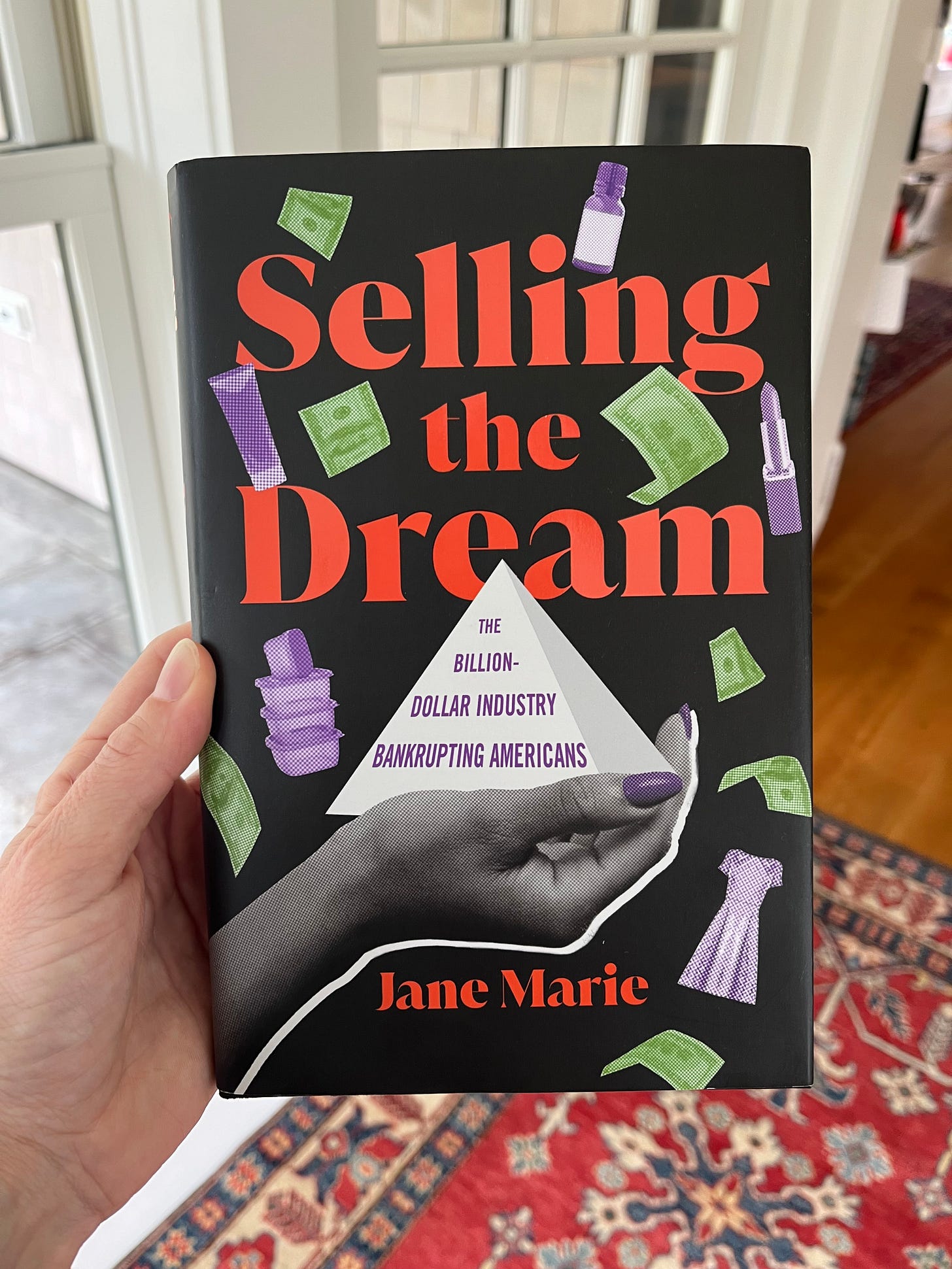When I listened to Jane Marie’s iconic podcast, The Dream, I did so in rapt, obsessive chunks whenever possible and I let pretty much all responsibilities fall by the wayside because MAMA WAS LISTENING TO HER PODCAST. I had heard of MLMs, but for whatever reason, they’d never infiltrated my life in any meaningful ways. Only a handful of friends of friends ever asked me to attend a party or whatever, and I was never hardcore pitched by anyone I had trouble saying no to. My point is that I was blissfully ignorant of how much harm MLMs have caused throughout history (and continue to cause), and The Dream opened my eyes.
In both her podcast, and her new book, Selling The Dream, Peabody and Emmy award winning journalist Jane Marie reports on a shockingly legal system of exploitation and corruption in which a handful of people become very, very rich, and thousands upon thousands of people lose money in the name of “business ownership.”
MLMs are often compared to cults and there are several good reasons for this (read my interview with Emily Lynn Paulson, who details the parallels between the coercive control tactics employed by MLMs and cults alike) ⬇️
Both cults and MLMs promise their members personal freedom, fulfillment, and community, and both cults and MLMs control their members by isolating them, blaming them for their failure to thrive, and deliberately discouraging any sort of curiosity or questioning of authority. If you’re fascinated with cults, you’re likely fascinated with MLMs, even if you don’t know it. Keith Raniere is famous for being a cult leader, but did you know NXIVM was also an MLM?
In Selling The Dream, Jane Marie writes that the then-CEO of Amway made a speech in 2009 at a company convention in which he said “It’s why we’re all here today. Personal freedom. The freedom to start your own business, to be your own boss. That’s what Amway’s about.” Despite the fact that 99.9% of people who join MLMs either lose money or barely break even, MLMs continue to thrive because they sell Americans what we’ve been taught to lust after: the American Dream, an illusion of meritocracy, capitalism at all costs, and rugged individualism. I’m such a fan of Jane Marie’s work, and if you’re into scams, want to understand more about why such a blatantly broken business model continues to flourish, and if you dig truly bizarre origin stories, you will love Selling The Dream.
Sara
For folks who aren’t familiar with your work, could you let us know how you became interested in MLMs, and why scams in general fascinate you as a journalist? (Season 2 of The Dream is about the scammy side of the wellness industry, and season 3 is (at least in part) about the scammy side of the life coach industry).
Jane
I guess I’m a business and money truther? I grew up with a bunch of friends and family who participated in MLMs and not one of them made money, so it was this question of: why do people keep signing up for this when there’s actually no money in it at all? And as soon as I started digging I found that it’s something all of us could fall for because it sounds great. I would LOVE to be rich with very little money down and zero experience, are you kidding me?!
Sara
I had heard of MLMs in a vague sort of way before listening to The Dream, but was largely ignorant about how many people the industry is targeting and harming. As soon as I started listening to the pod, I remembered friends who had sold Rodan and Fields, I remembered going to an Arbonne “party” as a broke college kid. I remembered being invited to buy “super cute” leggings through a Facebook mom group! In your book, you outline the many reasons MLMs continue to thrive despite 99.9% of participants either losing money or barely breaking even, but I wonder if lack of widespread awareness is still a factor in the survival of a transparently crooked business structure. What sort of shifts in public awareness have you noted in the many years you’ve reported on MLMs?
Jane
In the past 10 years there’s been a huge shift, with lots of journalists reporting on this world. And I’m super pumped about that, it’s about time. The real economic prospects in an MLM is what gets buried by their hoards of lawyers, but the anti-MLM community is now rabid, in a good way. There’s a Reddit community, plenty of Discord chat rooms about it, and at least stories are being published telling he truth? Before this, it really took a grassroots effort to try and close an MLM, from the people within the organization. But luckily today we can cause movement through social media.
Sara
I interviewed Emily Lynn Paulson last year, and we talked quite a bit about why mothers are so often targeted by MLMs. You write about how your great grandmother Maxine turned to Avon both for money AND for social reasons. Of Maxine, you write: “She never made real money with the company as far as anyone can tell, but the purpose and self-esteem and companionship she found there definitely kept her spirit alive.” Do you think mothers would be quite so vulnerable if any of the following things were true: mothers were paid for their labor, more mothers were in egalitarian partnerships, mothers were culturally respected (like doctors and lawyers are culturally respected), childcare was affordable and available for all moms?
Jane
NO LOL WHUT. I mean, that’s the REAL dream. But it’s not just moms, it’s anyone in a similarly precarious situation, right? The powers that be, which I explain in the book, are all the same people who are friends with each other, they have decided that the best way to enrich their own lives is to figure out a legal way to take money from regular people. They aren't wrong; it’s working great for them. AND they know that moms fall into this trap in so many different way that they purposefully target them. I can’t wait for the day we’re respected as the incubators and primary guardians of humans, but I don’t see it happening any time soon.
Sara
The story of Brownie Wise and Tupperware is fascinating to me on many levels. Wise really seems to have been a momfluencer before momfluencers were a thing. When she sold ladies on Tupperware, she was also selling them on a lifestyle: namely her own. Can you talk about how people in MLMs (especially women) are expected to become influencers today, adding yet another layer of unpaid labor into their “business building” ?
Jane
MLMs have always relied on social networks; recruit your mom and sister first or whatever. With social media, the world opened up to people who may not be able to make enough of those connections to keep the recruiting chain alive. So you now see a lot of people getting into this business who are relying on their parasocial online relationships to make money, which works for a lot of influencers! But I think trying to be an influencer in a space that sells a garbage business model and product is getting harder to do as folks become more critical.
Sara
The other reason Tupperware stands out for me is that it was a genuinely innovative product, whereas most MLMs now are selling crap that has been around for years except for three times the price. You detail how Tupperware came up with the “party” selling scheme so the product could be touched, tested, and seen in real life. This sort of makes sense to me given the novel nature of the product. But if MLMs are just hawking overpriced lipstick and banana print leggings, why the need for in person parties? I remember when I was invited to a LuLaRoe party and just immediately thought, why do I need to see a bunch of leggings in person and pretend it’s a social event? I’m curious about the future of social selling and MLMs. Do you think the in-person “parties” will persist?
Jane
I’m sure they will, absolutely. They come from the old model of door to door sales where someone walked into your house and sold you things you couldn’t get anywhere else. That’s how things used to be. So we’re like 130 years out from that boom and it’s still happening? I don’t see it going away. And frankly, if MLMs advertised their “opportunity” as a chance to hang out with your friends and but dishes, I would have no problem with that. It’s really fun! I love these parties. It goes sideways when everyone is told that these gatherings are the key to financial freedom; that you’ll be able to “retire your husband” if you have enough parties. The parties will persist because they add another little weight to the side of the scale the MLMs are trying to tip; that you now rely on them for not only money but community.
Sara
Can we talk vitamins?! I feel like if anyone wants to understand why the wellness industry is fraught, they need to start with vitamins lol. You write about the 1951 FDA ruling about drug standards and “structure/function” claims and I will never read a supplement label the same way again! And also - I feel like it’s BONKERS that I was confronted with a Rodan and Fields display while in the waiting room to see my pelvic floor physical therapist as a pregnant person with sore hips. To many, the presence of such products in a medical setting might seem like a tacit medical endorsement, right? Seems fucked!
Jane
Oh I’m so so sorry that happened to you, how disconcerting! The mainstreaming of a lot of wellness products – which make up a huge portion of MLM products – is a really important industry to look at. There is no, as I like to call it, “before the fact” regulation of any wellness products, vitamins, or supplements. Anyone can package up whatever and sell it so long as they register with the FDA, but there's no testing, no oversight of that industry. And now that is extending to wellness services, like you ran into.
Sara
Tell us about your new podcast!
Jane
My new show is called Dear Jane Marie, and it’s framed as an advice show, which we do take seriously, but the advice part allows my guests and I to explore the different ways we humans look at struggle, conflict, family, friends . . . and makeup.
I enjoy learning about MLMs because I enjoy learning about people, power, and psychology. I also enjoy learning about MLMs because every story about an MLM comes with a massive cuppa piping hot English Breakfast.








